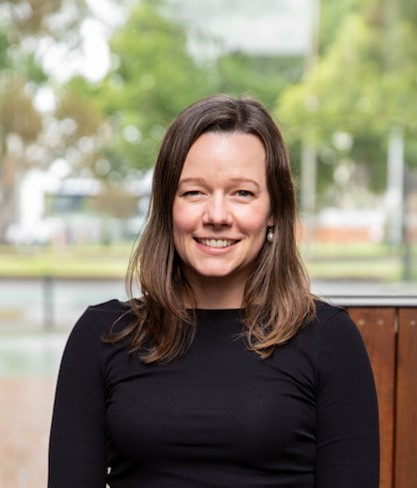A/Professor Michelle Halls

Winner of the 2023 Geoffrey Burnstock Prize
Talk title: Spatial organisation of beta2-adrenoceptor signalling in triple negative breast cancer
Biography: Associate Professor Michelle L Halls leads the Spatial Organisation of Signalling laboratory at the Monash Institute of Pharmaceutical Sciences (Monash University, Australia). Her research is focused on understanding how receptors (particularly G protein-coupled receptors) control localised signalling, how this organisation can be hijacked by disease, and how these signals can be targeted to gain greater therapeutic efficacy. Michelle obtained her PhD in Molecular Pharmacology from Monash University in 2007, before training in single cell biology as a NHMRC CJ Martin Fellow at the University of Cambridge, UK. In 2011, she established her research group within the Drug Discovery Biology Theme at MIPS. A/Prof Halls is currently a Viertel Senior Medical Research Fellow and the Deputy Theme Leader for Drug Discovery Biology. Awards include the 2024 ASCEPT Achievement Award, 2023 British Pharmacological Society Geoffrey Burnstock Prize, and 2019 Faculty of Pharmacy and Pharmaceutical Sciences Future Research Leader Award.
Professor Neeraj (Bean) Dhaun
Winner of the 2022 Graham Smith Prize
Talk title: The eye as a window to the kidney: multimodal retinal imaging to stratify risk, monitor progression and guide treatment
Biography: Bean is Professor of Nephrology at the University of Edinburgh and a Consultant Nephrologist at the Royal Infirmary of Edinburgh. He currently works between Edinburgh and Paris. His expertise is in hypertension, immune-mediated renal disease, in particular vasculitis and complex renal transplantation. He runs the Edinburgh Vasculitis Service.
Bean has research interests in the role of the immune system in the development and progression of hypertension as well as hypertension in the setting of chronic kidney disease. Bean’s research group focuses on the cardiovascular risk associated with the spectrum of chronic kidney disease from early in the disease trajectory through to kidney failure requiring dialysis or kidney transplantation. They perform pre-clinical and clinical pharmacology studies as well as investigating cardiovascular risk at a population level. Their goals are to identify cardiovascular risk early in people with kidney disease and, through experimental medicine studies, to explore novel therapies that might reduce this risk and so potentially improve longer-term outcomes.
Dr Chengcan Yao
 Winner of the 2024 Geoffrey Burnstock Prize
Winner of the 2024 Geoffrey Burnstock Prize
Talk title:
Prostaglandin E2: Protector or Provocateur in Gut Inflammation?
Biography: Dr Chengcan Yao, PhD, FBPhS, is a Reader in Immunopharmacology and group leader in the University of Edinburgh Centre for Inflammation Research, Institute for Regeneration and Repair. His research focuses on illustrating mechanisms underpinning the development and resolution of inflammation. In particular, his group is interested in understanding the roles of bioactive lipid mediators in physiology and pathology of barrier tissues such as the intestine, lung, and skin. Before establishing his independent research at the University of Edinburgh, he did his PhD and postdoc training in Kyoto University. He is an elected fellow of the British Pharmacological Society, a member of NC-IUPHAR committee, and a board member of the European Society for Lipid Mediators. He has obtained many prestigious awards including Chancellor’s Fellowship by the University of Edinburgh, Career Development Award by the Medical Research Council, Geoffrey Burnstock Prize by the British Pharmacological Society, and Young Investigator Awards (for Asst./Assoc. Professors) by the International Eicosanoid Research Foundation.




